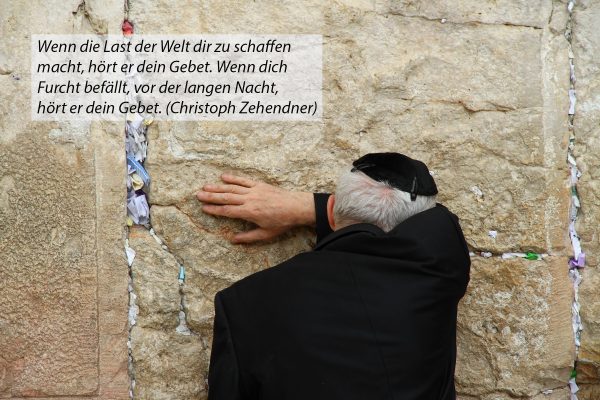
[nx_spacer size=“5″]Das ist ein faszinierender Platz in der Altstadt von Jerusalem: die West- bzw. Klagemauer. Sie ist so etwas wie eine Freiluft-Synagoge und eine der wichtigsten religiösen Stätte des Judentums. In den nach Geschlechtern getrennten Gebetsbereichen kommen Gläubige aus der ganzen Welt, um zu beten (nicht unbedingt um zu klagen) und in den jüdischen Schriften zu lesen.
Eigentlich ist die Klagemauer nur ein Ersatz-Ort, denn am heiligsten Punkt des Tempelberges steht seit dem 8. Jahrhundert der islamische Felsendom.
Viele Besucher, Jung und Alt, stecken aufgeschriebene Gebete, Wünsche und Danksagungen in die Ritzen und Spalten der Mauer. Im Frühjahr und Herbst werden die Zettel entfernt und ungelesen auf dem jüdischen Friedhof auf dem Ölberg begraben.
Der Platz davor dient als Veranstaltungsort für religiöse Zeremonien wie die Bar Mizwa (Feier der Religionsmündigkeit) und auch für militärische Events.
Ich war mehrmals hier, zu verschiedenen Tageszeiten, und jedes Mal war der Platz voll. Als ich während einer Reise eine Woche lang in Jerusalem verbrachte, konnte ich an mehreren Tagen stundenlang an der Mauer verweilen. Problemlos konnte ich fotografieren, filmen und mich mit manchem Beter unterhalten (u. a. mit einem jungen Juden aus den USA). Ich kann einen Besuch (oder mehrere) sehr empfehlen, sowohl als Tourist als auch als Beter.
Bildergalerie / Galería de fotos (Fotos: edp, 2013, 2017 und 2019)
Erstes Bild anklicken, um den Bilderablauf zu starten. Wenn man auf den i unter dem Foto anklickt, erscheint bei einigen Bildern oben rechts eine Information.
Un lugar digno de visitar
El Muro de los Lamentos es uno de los lugares religiosos más importantes del judaísmo. Es algo así como una sinagoga al aire libre. En las áreas de oración, que están separadas según el género, los creyentes de todo el mundo vienen a orar (no necesariamente a lamentar) y a leer las escrituras judías.
En realidad, el Muro de los Lamentos es sólo un lugar sustituto, porque en el punto más sagrado del Monte del Templo se encuentra la Cúpula Islámica de la Roca desde el siglo VIII.
Muchos visitantes, jóvenes y mayores, ponen oraciones escritas, deseos y agradecimientos en las grietas y hendiduras de la muralla. En primavera y otoño las notas se retiran y se entierran sin leer en el cementerio judío del Monte de los Olivos.
La plaza frente al muro sirve para ceremonias religiosas como el Bar Mitzvah (celebración de la madurez religiosa) y militares.
Estuve aquí varias veces, a diferentes horas del día, y cada vez el lugar estaba lleno. Cuando durante un viaje pasé una semana en Jerusalén, visité por muchas horas durante varios días este lugar. No tuve problemas en tomar fotos, filmar y hablar con varias personas que aquí leían y oraban (incluyendo un joven judío residente en los Estados Unidos). Recomiendo mucho una visita (o varias), tanto como turista como para orar o meditar.
Véase arriba la galería de fotos.
Con un klick sobre la primera foto comienzan a pasar las fotos.





